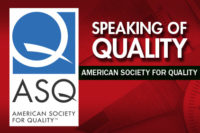Speaking of Quality
Automotive Quality Improvement Teams
Facilitating and improving a company's supply chain.

As the New Year begins, it appears the automotive industry has weathered the literal and figurative storms of 2012. The criticism concerning lack of industry innovation has momentarily quieted as 50 new models were introduced in 2012. Innovation is alive and well. Profits are increasing. But, it appears, so are recalls. While recalls might be considered solely risk management and safety issues, a root cause may lie in a lack of coordination with the automotive supply chain. When effective, quality improvement teams facilitate and, ultimately, improve the company’s supply chain.
While teams may not be a solution for every problem, a solid team culture certainly improves communication. This approach to communication is important not only with employees but with suppliers and the public as well. Since the official Toyota 2010 recall report was issued February 11, 2011, auto makers have been very careful to be transparent and be sure any suspect parts are taken out of the market. This has shed light on the incredibly intricate supply chain. The Council of Supply Chain Management Professionals (CSCMP) defines supply chain management as:
“An integrating function with primary responsibility for linking major business functions and business processes within and across companies into a cohesive and high-performing business model. It includes all of the logistics management activities noted above, as well as manufacturing operations, and it drives coordination of processes and activities with and across marketing, sales, product design, finance and information technology.”
This is a detailed description for a complex concept. Supply chain management integrates multiple companies—all seeking to maximize revenue and protect their organizational interests—in diverse geographical regions, with many different languages and cultural customs. The knowledge (and interest) each of these companies has for their “partners” might be questioned. For the supply chain—or extended enterprise—to work effectively, these companies need to form a self-organizing network of cooperating businesses. It is within this complex system that quality improvement teams can benefit all partners.
Automotive companies are very aware of the complexities and risks of this intricate system. But while the supply chain is intricate, the supply chain does not need to be delicate. Quality improvement teams not only improve communication, the quality tools used help the teams effect change and save money. In the team culture, process improvement does not fall on one quality division. Process improvement becomes enterprise wide, encompassing hundreds of quality improvement teams.
For example, the ASQ case study, “General Motors Technical Problem-Solving Group Drives Excellence,” introduces us to Red X, a GM cross-functional team. The team turned to lean and the Red X approaches they use to solve vehicle performance issues to increase their output of completed projects by making the problem-solving process more efficient. To read more about the GM Red X—and other automotive industry teams—visit the ASQ International Team Excellence case studies page (http://wcqi.asq.org/team-competition/case-studies.html).
Automotive companies are held to a high standard and with good reason. When drivers get behind the wheel, they want the peace of mind of stepping into a safe vehicle. It is a reasonable request of the industry that no one can argue. The industry, using its 60-plus years of quality methodology use, is very conscientious about meeting strict waste reduction and no defect goals. Government regulations continue to challenge the industry to produce environmentally friendly cars and trucks. Add to the mix ever-increasing customer expectations—well beyond the standard safety features—and this combination of legislative and consumer requirement guarantees that any recall news will get the public’s attention. There is a great deal of pressure placed on the automotive industry to get supply chain management in excellent shape.
Fortunately, the automotive industry has embraced modern quality concepts since the 1940s. With the expertise of quality improvement teams, it has also championed new methods in the 60-plus years since. However, no company is infallible. No product line will survive production without defect. The willingness of the automotive industry to embrace a quality team culture has led to innovation, cost savings, and a renewed enthusiasm for the quality of work they produce every day.
ASQ has many free resources available for your use. Here are a few useful articles and presentations.
- International Team Excellence Award Summaries — Visit http://wcqi.asq.org/team-competition/case-studies.html and scroll down to the Ford and GM teams’ presentations.
-
For the following articles, visit http://asq.org/knowledge-center/index.html and type the article title in Search Knowledge Center.
- “What Have We Learned?”
- “Site Seeing”
Looking for a reprint of this article?
From high-res PDFs to custom plaques, order your copy today!





